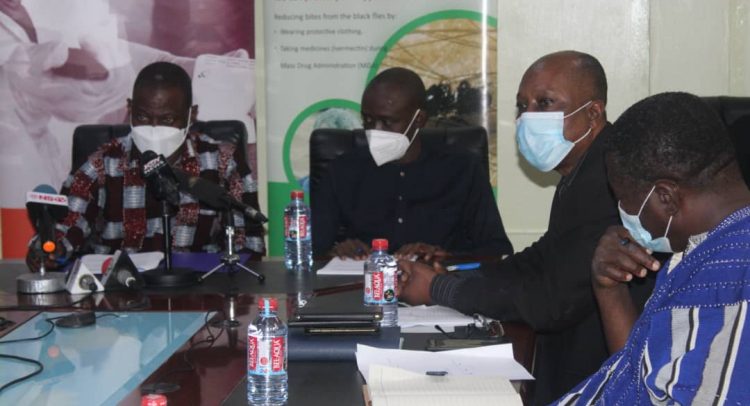Dr Patrick Kuma-Aboagye (left) speaking at the media briefing .
In its quest to eliminate onchocerciasis also called river blindness, the Neglected Tropical Diseases (NTDs) Programme of the Ghana Health Service (GHS) will begin a Mass Drug Administration (MDA) exercise in endemic regions of the country on Monday.
The MDA exercise, starting from Monday August 23 to September 6, 2021, will provide a therapeutic dose of an effective NTD medicine at no cost to the targeted population in 66 districts across 13 regions.
The targeted regions are Ahafo, Ashanti, Bono, Bono East, Eastern, North East, Northern, Oti, Savannah, Upper East, Upper West, Western and Western North. In all 4,740,039 people excluding children less than five years old, pregnant mothers, and seriously ill individuals are expected to receive the medication.
Director General of the GHS, Dr. Patrick Kuma-Aboagye at a media briefing in Accra today said the country has 137 onchocerciasis endemic districts but the exercise will take place in only 66 districts.
“These are districts whose epidemiological and entomological indices need some attention compared with the others with good indicators that have been earmarked for a stop-MDA study to decide whether it is safe to stop MDA in the respective districts,” he said.
Dr. Kuma-Aboagye said the programme has put in place comprehensive measures including the training of health officers and Community Drug Distributors (CDD) on the drug. Administration and Covid-19 prevention protocols.
He emphasized that the medicine is safe for use adding that all health facilities in the endemic zones have been put on alert to manage any adverse drug event free of charge should any case be recorded.
“During the period CCDs would visit every household, register and give our Mectizan/Ivermectin tablets to eligible individuals. We expect all eligible persons to partake in this exercise. Refusal may form reservoirs for continuous transmission,” he added.
In Ghana, MDA is done twice in a year to ensure that every eligible person living in a defined geographical area, regardless of whether or not they are infected receives the medication to control onchocerciasis.
Onchocerciasis is an infection caused by a parasitic worm called Onchocerca volvulus. It spreads by the bite of an infected blackfly known scientifically as Simulium.
It is also called river blindness because the blackfly that transmits the infection breeds in rapidly flowing rivers and streams and bites people living in settlements nearby and causes them to go blind.
Persons with heavy infections as a result of repeated bites by infected blackflies usually develop conditions such as unrelenting itching, unsightly skin disease, nodules under the skin, or eye disease which results in severe visual impairment and blindness.
By Jamila Akweley Okertchiri

